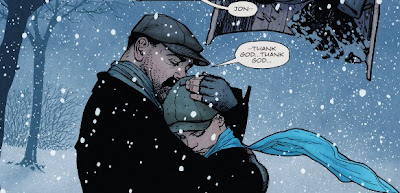The total rejection of established laws and institutions.
Anarchy. Terrorism. Other revolutionary activity.
Total, absolute destructiveness to the world at large,
including oneself.
The denial of all real existence or even the possibility
of truth.
Nothingness.
Nonexistence.
It assumes that life is
"A tale
told by an idiot,
full of sound and fury,
signifying nothing.”
It makes virtue into
"an honorable form of stupidity."
It forces wisdom to become nothing more than
"mistrustful"
"contradictions."
Everything becomes nothing. Worthless.
In the end, it seems, there's only one guy left laughing:
"Edward Morgan Blake. Born 1924. Forty-Five years a comedian, died 1985, buried in the rain.
Is that what happens to us? A life of conflict with no time for friends... Violent lives, ending violently... We never die in bed. Not allowed.
Something in our personalities, perhaps? Some animal urge to fight and struggle, making us what we are? Unimportant. We do what we have to do. Others bury their heads between the swollen teats of indulgence and gratification, piglets squirming beneath a sow for shelter... but there is no shelter... and the future is bearing down like an express train.
Blake understood. Treated it like a joke, but he understood. He saw the cracks in society, saw the little men in masks trying to hold it together... He saw the true face of the twentieth century and chose to become a reflection, a parody of it.
No one else saw the joke. That's why he was lonely.
Heard a joke once:
Man goes to doctor. Says he's depressed. Says life seems harsh and cruel. Says he feels all alone in a threatening world ahead is vague and uncertain. Doctor says 'Treatment is simple. Great clown Pagliacci is in town tonight. Go and see him. That should pick you up.' Man bursts into tears. Says 'But, Doctor... I am Pagliacci.'" Rorschach.
The Comedian was the first of the Watchmen to die.
And, with him went his perspective.
Perhaps he was the only one of these heroes who was able to see the world as it really was. He knew that men lived, men died, people laughed, and people cried. There was nothing he could do against the violence, death, warmongering, and hate surrounding him. Still, he had had a life filled with orders that he had to fulfill. He accomplished things unthinkable to most men. And, perhaps worst of all, he enjoyed it.
Now, this wasn't your typical kind of enjoyment. It wasn't out of giddy laughter or playfulness. He didn't succeed by giggling and chuckling until his murder-count was through the rough. He survived because he saw the futility of the world. He recognized the meaninglessness behind it all. There was no merit or reason for death. There was no purpose behind wisdom, virtues, morals, or even life. But, instead of giving in and caving to the depression that nihilism should bring to any sane individual. The Comedian saw the world laughing at him in his futility. And, instead of crying or backing away, he chimed in with the laughter.
He became part of the joke.
But, even in his sick, twisted, corrupt, and perhaps accurate view of the world, he failed to find purpose. His lunacy lacked meaning. And, he was alone, lost in nihilism. This is the fate of all those who follow the patterns of this world.
If we live in a world where "The question of truth and the question of what is good cannot be separated from each other." And, "If we can no longer recognize what is true and can no longer distinguish it from what is false, then it becomes impossible to recognize what is good; the distinction between good and evil loses its basis."
When we take truth out of the picture, as nihilism does, there is no good. In fact, there is no bad either. Life just is what it is. Whatever that should be. And, we are just another part of the same bad joke.
All is vanity.
What does it mean to gain
by all the toil at which he toils under the sun?
A generation goes, and a generation comes...
The sun rises, and the sun goes down
and hastens to the place where it rises...
All streams run to the sea,
but the sea is not full...
All things are full of weariness;
a man cannot utter it;
the eye is not satisfied with seeing,
nor the ear filled with hearing.
What has been is what will be,
and what has been done is what will be done,
and there is nothing new under the sun.
Is there a thing of which it is said, 'See, this is new'?
It has been already in ages before us.
There is no remembrance of former things,
nor will there be any remembrance of later things yet to be..."
"What is crooked cannot be made straight,
and what is lacking cannot be counted.
I have said in my heart, 'I have acquired great wisdom...'
And I applied my heart to know wisdom
and to know madness
and folly.
I perceived that this also is but a striving after wind.
For in much wisdom is much vexation,
and he who increases knowledge
increases sorrow."
The more that we apply ourselves to know the things of the world, everything under the sun, the more we know its meaninglessness. Purpose cannot be found in this kingdom. It can never be accurately found or known in the physical because it is something metaphysical. It is the Logos, the Word, the Flesh of Christ. Here, His sacrifice, His purpose, His reason and meaning are the only grounds we have to cling to something more... something meaningful.
I admit, there are other idols out there. Aphrodite, Loki, and Mammon... the worship of sex, mischief, glutton and money run rampant through our streets. And, those are only the most obvious. What about worshiping performing works? Worshiping learning and knowledge? Worshiping the way we worship?
These all come up short.
Just as the leaves fall in autumn and rocks erode beneath sea-waves, these gods fall away. Our appetites for them cease. They bear no real substance to sustain our souls. They are too defeated by nihilism.
But, One lasts. One remains. One has carried all of our meaninglessness and rambling on His bloodied back to bring purpose into the purposeless world. So that now we too can have meaning in our lives through Him. Through His Word, through His Love, through His gifts. There is Reason behind our lives, not just Chaos.
"Unless the Lord builds the house,
those who build it labor in vain.
Unless the Lord watches over the city,
the watchman stays awake in vain."
The Lord has watched over this city,
He has remained with His people,
and He has fulfilled His covenant through Christ.
If only those like the Comedian could have found the Purpose before it was too late.
Then, he would have found a whole different type of joy.
"For the joy of the Lord is your strength."



.jpg)










































